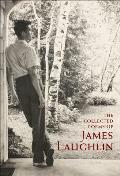
Fall has brought us a true gift in the publication of the massive
The Collected Poems of James Laughlin, published by New Directions in an exceptionally beautiful hardcover edition. The book includes an inexhaustible number of poems, in a lovely 1,214(!) page tome.
Laughlin is best known as the founder of New Directions Publishing, the U.S. publisher that championed, and has continued to champion, the work of people as diverse as Ezra Pound and Denise Levertov, Hermann Hesse and Henry Miller, William Carlos Williams and Roberto Bolaño, and Muriel Rukeyser and Clarice Lispector. There's a story about the origins of this dedication to such a broad and defining list, one that would go on to help shape Modernism in our time. It goes like this: when Laughlin was a young man, he took a leave from his studies at Harvard and went to study with Pound in Italy. In the end, Pound told Laughlin he couldn't write, so he should go home and use his money (Laughlin's family was quite wealthy) and publish those who could. Namely, as it turned out, Pound and his friends.
Apocryphal or not, the rest is history.
However, history can be read in many ways, and one of the ways that Laughlin's history has to be read is in his breaking from Pound's judgment and becoming a celebrated poet in his own right.
Laughlin's poems are exceptionally lovely and often very easy to read. However, they include depths of emotion, insight, and tenderness that puts them in a realm of their own. Even though Laughlin often peppered his verse with French or Italian words and phrases, he was writing for you and me, and his poems — beautiful, spare, evocative — move our hearts.
This poem is called "The Darkened Room":
The room which was onceso bright has no illumi-
nation now the curtains
have been pulled shut and
the lamps have no bulbs
the man who lives here is
blind he has no need of
light sees what he
needs with his hands he
lives alone a neighbor
brings him his food his
book is memory her face
is clear on the page of
his blindness his music
is the recollected sound
of her voice he is lone-
ly but he is content.
Laughlin explored various line breaks and patterns of rhythm and structure throughout his life, and his subjects varied widely as well. Plagued by bipolar disorder, an avid athlete and correspondent, as well as a devoted womanizer, he never lacked for subjects.
He writes in the foreword to his 1998 book, Poems New and Selected:
Many of the writings in this book should be called verse rather than poetry. Poetry is an exalted, almost mystical writing in its nature. Poetry works with devices such as metaphor and verbal decoration. This writer seldom aspires to such high levels of expression. His writings are most often the statement of facts as he has discerned them. Many are reports on perceived feelings, his own and those of others; or a placing with imagination; or recollections from reading of matters with which classical writers were concerned. There is a minimum of decoration.
He goes on to write:
SOME PEOPLE THINKthat poetry should be a-
dorned or complicated. I'm
not so sure. I think I'll
take the simple statement
in plain speech compress-
ed to brevity. I think that
will do all I want to do.
I actually think that poetry goes a bit further than what Laughlin claims here. A poet touches on human matters, on the things that are near and dear to us, even when we are not initially clear on what they may be. He or she explores them and cajoles or batters them into a form that opens them up into the deepest part of us, fiercely claiming them as a part of an interior terrain on which we live our lives. We choose our poets by what speaks to us: a poet is a beloved voice that is turned to again and again, in all sorts of moods and states of mind to enrich and ascribe meaning and succor to our lives.
This massive book is one that is perfectly positioned to be just such a companion on the journey of life. It will sit on your bedside table, or on a coffee table, or on a shelf, until you need it. And, if my decades-long experience of James Laughlin, the man — the poet — who Pound claimed couldn't write, is true and even barely universal in any sense at all, you will indeed need it and turn to it and be just a little bit more secure in knowing that your heart and mind are not alone in a world gone haywire.